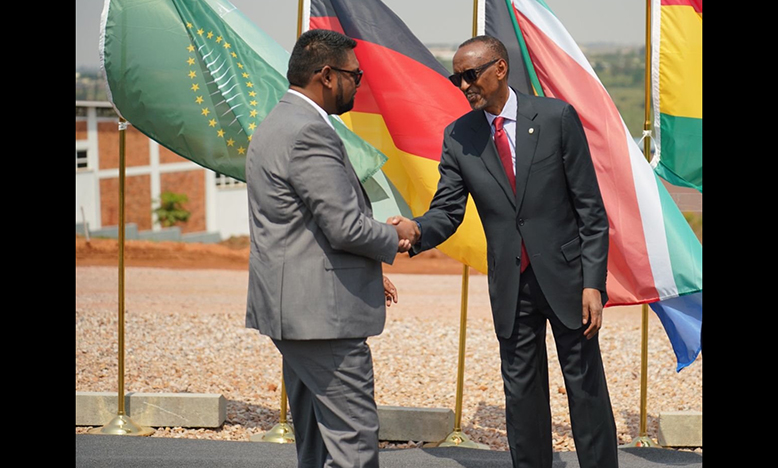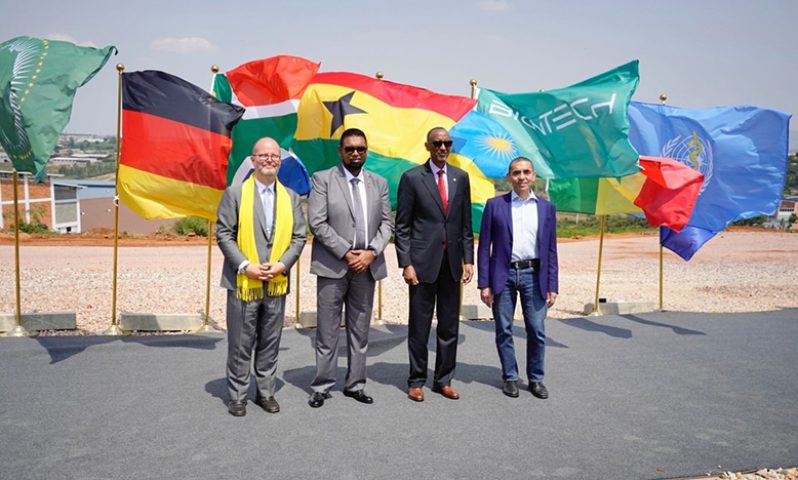–President Ali says, following sod-turning ceremony for first African vaccine-manufacturing facility in Rwanda
–project to be run by BioNTech targets COVID-19, malaria, tuberculosis vaccines
By Rabindra Rooplall in Kigali, Rwanda
PRESIDENT Dr. Irfaan Ali has said that Guyana will work with countries like Rwanda to put the necessary framework in place for the establishment of a local vaccine-producing plant.
“We want people to come to Guyana and develop vaccine and treatment for diseases like malaria. It is important, as a country, that we respond to the needs and makes ourselves vaccine secure,” Dr. Ali said on Thursday, following a sod-turning ceremony for a new mRNA vaccine factory in the special economic zone of the Gasabo District, Rwanda.
President Ali, who joined the President of Rwanda, Paul Kagame and other world leaders for the event, said: “I am on a forward-looking and proactive mission to work with countries like Rwanda… work with them to build the regulatory framework and institutional and training facilities for highly skilled and capable human resources to transition into these new fields and areas.
“It is in that context that I was invited to the function and I am going to start discussions at the bilateral level.”
Dr. Ali said that his intention is to upgrade Guyana’s law-making and governing agendas, and invest in the requisite research to enhance the pharmaceutical industry in Guyana.
This is also on the cards at a time when the world is recovering from the COVID-19 pandemic, which has highlighted the disparity in the manufacturing and distribution of vaccines.
President Ali said that part of his government’s overarching development agenda for the economy is to invest in healthcare and education.

Further, he added that Guyana has already initiated talks with Barbados for the advancement of the health sector, particularly as it regards the establishment of a vaccine-producing facility.
“Prime Minister [of Barbados] Mia Mottley and I have had discussions already on regulations and the Attorney Generals of both countries are to look at the existing legal framework and what is needed,” President Ali said.
Vaccine-producing facilities, he said, will enhance the region’s ability to address diseases like malaria, typhoid and HIV/AIDS.
He said BioNTech is an example of a company that countries in the Caribbean region could work with to realise the shared goals of expanding the region’s pharmaceutical industry.
At the launch of the facility, President Kagame said: “The ground breaking for BioNTech’s state-of-the-art mRNA production facility is a pivotal milestone. We are happy to have BioNTech as a partner, and I applaud the company’s commitment to working with Africa on a continental basis to help secure our vaccine resilience for the future, and invest in new research to address the endemic diseases that disproportionately affect our people.
“Working with our partners, Rwanda intends to build on this investment to attract a vibrant biopharmaceutical research and manufacturing sector.”
The African Union and the Africa Centres for Disease Control and Prevention aim to have about 60 per cent of Africa’s routine vaccines produced locally by 2040.
NEXT MILESTONE
Chief Executive Officer (CEO) and Co-founder of BioNTech, Professor Ugur Sahin, said: “We have reached the next milestone with the start of construction on the first African mRNA manufacturing facility based on our BioNTainers – just four months after we introduced the BioNTainer concept in February.
“This factory will be the first in an African network to provide sustainable production capacity for mRNA pharmaceuticals. Further, manufacturing facilities in Africa and on other continents are planned to follow. The goal we pursue together with governments and regulatory authorities is to produce vaccines for Africa here with highly skilled professionals from Africa.”
World Health Organisation (WHO)’s Director-General, Dr. Tedros Adhanom Ghebreyesus, said: “The COVID-19 pandemic has exposed the need for significantly greater local production of vaccines and other essential products in all regions of the world, especially in Africa which relies heavily on imported products and was left behind in the global rush for COVID-19 vaccines.
“I welcome BioNTech’s efforts to establish manufacturing sites in Rwanda, Senegal and South Africa, as well as its plans to commence clinical trials of its malaria vaccine candidates later this year.”
The construction of the vaccine factory in Rwanda will enable the manufacturing of vaccines for domestic use and export to other Member States of the African Union at a not-for-profit price.
According to BioNTech, the manufacturing capacity for vaccines will be expanded incrementally by adding further manufacturing lines and sites to the manufacturing network on the African continent, to support the production of several hundreds of millions of mRNA vaccine doses.
The local production capabilities will further address vaccine uptake in Africa which has fallen short of expectations due to misinformation, logistical problems, a lacking sense of urgency in the population to name a few factors.
The Rwandan facility, with a size of about 30,000 square meters, will be initially equipped with two BioNTainers (one for the production of mRNA, and one for the production of the formulated bulk drug product).
The BioNTainers will be equipped to manufacture a range of mRNA-based vaccines to suit the needs of the African Union Member States; this could include the Pfizer-BioNTech COVID-19 vaccine and BioNTech’s investigational malaria and tuberculosis vaccines, if they are successfully developed, approved or authorised by regulatory authorities.
The estimated initial annual capacity of the Pfizer-BioNTech COVID-19 vaccine will be about 50 million doses.
The manufacturing of vaccines in the BioNTainers in Rwanda is expected to commence approximately 12 to 18 months after their installation. The facility will be initially equipped with two BioNTainers, and is expected to employ about 100 staff by 2024.




.png)









